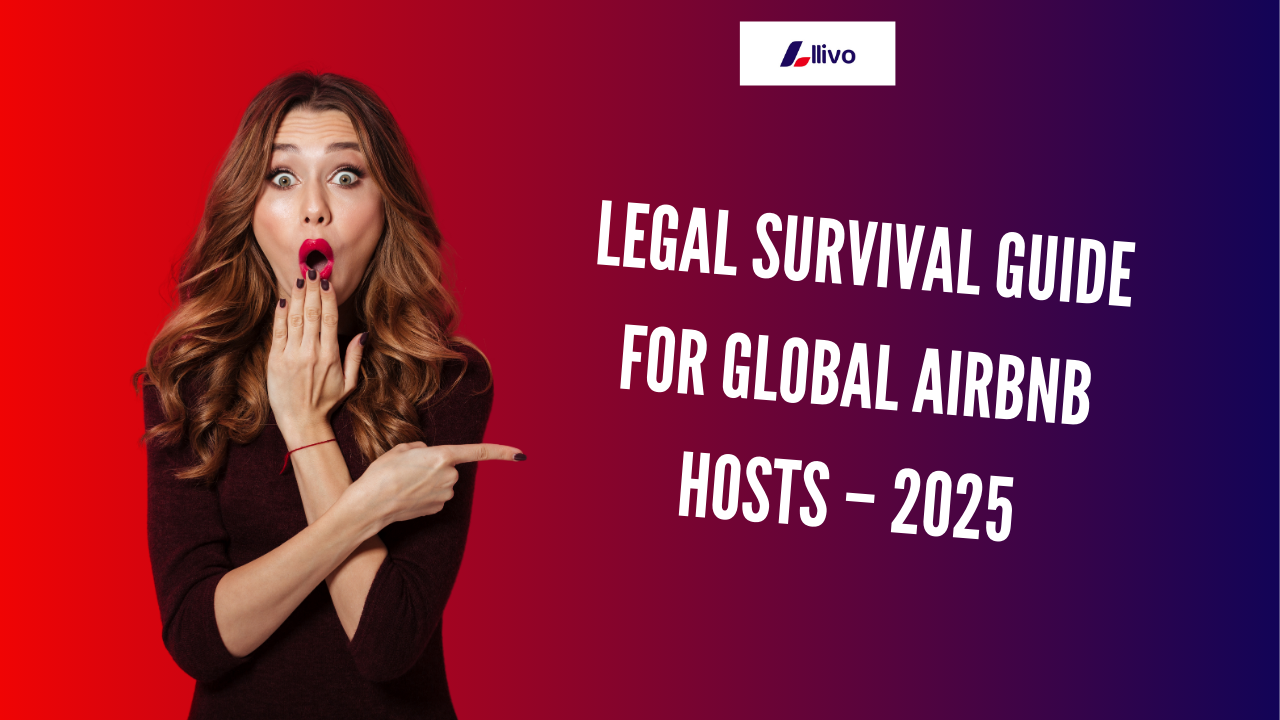Must-Know Legal Tips for Airbnb and Vacation Rentals in 2025

Navigating Short-Term Rental Laws: A Global Host's Guide to Compliance and Success
The short-term rental industry is undergoing dramatic regulatory changes worldwide in 2025, with 85% of Airbnb listings located outside the United States. Whether you're managing a vacation rental in Barcelona, a holiday home in Bali, or an apartment in Tokyo, understanding local laws is crucial for sustainable hosting. At Llivo—the only platform combining short-term rentals with airport pickup services—we help hosts navigate these complexities while maximizing earnings through our host-friendly 12% fee structure and zero guest fees.
This comprehensive guide covers:
- Global regulatory trends impacting short-term rentals from Europe to Asia
- Step-by-step compliance strategies for hosts worldwide
- How Llivo's unique model helps hosts avoid common legal pitfalls
- Actionable tips to protect your rental business in 2025's evolving landscape
1. 2025's Global Short-Term Rental Regulations
A. Worldwide Regulatory Trends
The short-term rental market faces increasing scrutiny across continents:
Europe:
- Barcelona's controversial "license lottery" system has reduced available rentals by 40% since 2023.
- Paris enforces strict 120-night annual limits with €50,000 fines for violations.
- Portugal's new "Mais Habitação" law bans new AL (Alojamento Local) licenses in major cities.
Asia-Pacific:
- Japan requires all minpaku operators to register with local governments.
- Bali mandates special permits for villas under new 2025 tourism laws.
- Australia's NSW region imposes 180-day caps with hefty penalties.
Americas (Beyond USA):
- Mexico City introduced neighborhood-specific zoning restrictions.
- Toronto requires principal residence proof for all STR operators.
- Rio de Janeiro limits rentals to specific tourist zones.
Pro Tip: Always check Llivo's Policies and Best Practices for updated country-specific guides before listing your property.
B. The Tax Compliance Challenge
Global hosts must navigate:
- VAT/GST requirements in EU/UK/Australia (typically 10–20%).
- Tourist taxes (€1–5 per night in most European cities).
- Income reporting thresholds varying by country.
Critical Note: Many platforms only handle tax collection in certain regions—hosts are often responsible for remitting payments.
2. Essential Legal Framework for International Hosts
A. Global Licensing Requirements
Every host should secure:
- Business registration (varies from simple sole proprietorship to full company setup).
- Tourism accommodation license (required in 75% of markets).
- Safety certifications (fire, electrical, gas).
Regional Examples:
- EU: CE marking for all appliances.
- UK: Gas Safety Certificate mandatory.
- UAE: DTCM license required in Dubai.
B. Insurance Considerations Worldwide
Standard policies often exclude STR activities. Recommended coverage:
- Public liability (minimum €1M in EU, $1M in Americas).
- Contents insurance for host and guest belongings.
- Loss of income protection for regulatory changes.
Llivo Advantage: Our host protection program includes €1M liability coverage in eligible markets.
3. Operating Legally Across Different Jurisdictions
A. Lease and Ownership Restrictions
- Renters: 60% of global markets require landlord consent.
- Condo/HOA rules: Increasingly ban STRs (especially in Thailand, Spain, Canada).
- Co-ownership properties: Often have additional restrictions.
B. Data Privacy Compliance
With GDPR (EU), PIPL (China), and other regulations:
- Guest data collection must be documented.
- Security cameras require explicit disclosure.
- Payment processing must meet local standards.
4. How Llivo Supports Global Hosts
A. Localized Compliance Tools
- Automated tax calculations for 45+ countries.
- Permit requirement checklists by city.
- Document storage for licenses and certifications.
B. Competitive Advantages
- 12% host fee (vs Airbnb's 15–20%) means more profit for compliance costs.
- Airport transfer integration reduces illegal taxi risks for guests.
- Multilingual support for cross-border hosting.
Global Hosting Best Practices
-
Research Before Listing
- Consult local tourism boards.
- Join host associations in your region.
- Verify zoning laws with municipal offices.
-
Document Everything
- Keep copies of all permits.
- Maintain guest registration records.
- Save tax payment confirmations.
-
Stay Adaptable
- Regulations change frequently—set Google Alerts for your market.
- Consider forming local partnerships for complex markets.
-
Leverage Technology
- Use channel managers that track regulatory changes.
- Implement automated compliance checks.
Conclusion
Navigating 2025's global short-term rental landscape requires vigilance but offers tremendous opportunities. By combining local compliance knowledge with Llivo's host-friendly platform, you can build a sustainable rental business that stands the test of time and regulation.
Ready to list your property? Join Llivo's global host community today and enjoy lower fees, built-in compliance tools, and premium airport transfer integrations.
Author Bio
Khurram Iqbal Founder of LLIVO | Global Short-Term Rental Expert | Advocate for Fair Hosting Regulations | IT Innovation Leader
Disclaimer
This article provides general information about international short-term rental regulations. Laws change frequently and vary by jurisdiction. Always consult local legal experts for specific advice. Users are advised to validate the accuracy of data as it might not be exact, and LLIVO is not responsible for the accuracy of data.
- Art
- Causes
- Crafts
- Dance
- Drinks
- Film
- Fitness
- Food
- Spiele
- Gardening
- Health
- Startseite
- Literature
- Music
- Networking
- Andere
- Party
- Religion
- Shopping
- Sports
- Theater
- Wellness
- IT, Cloud, Software and Technology


